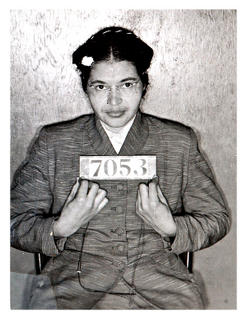(image source)
Update (Weds 10/26): Via Facing South, Paul Loeb captures the important way in which Rosa Parks' achievement is misremembered in this country:
[The] familiar rendition of [Rosa Parks'] story... stripped the Montgomery, Ala., boycott of its most important context. Before refusing to give up her bus seat, Parks had spent 12 years helping lead the local NAACP chapter. The summer before, Parks had attended a 10-day training session at Tennessee's labor and civil rights organizing school, the Highlander Center, where she'd met an older generation of civil rights activists and discussed the recent U.S. Supreme Court decision banning ''separate but equal'' schools.
In other words, Parks didn't come out of nowhere. She didn't single- handedly give birth to the civil rights efforts. Instead, she was part of an existing movement for change at a time when success was far from certain. This in no way diminishes the power and historical importance of her refusal to give up her seat. But it does remind us that this tremendously consequential act might never have taken place without the humble and frustrating work that she and others did earlier on. It reminds us that her initial step of getting involved was just as courageous and critical as the fabled moment when she refused to move to the back of the bus.
This is a crucial point, ill-remembered today. The Civil Rights Movement was, above all, the work of local people (to borrow the title of John Dittmer's wonderful book on the subject), not simply famous heroes. Heroism requires preparation, organization, and work. If we remember only the myth of a single act of defiance, we loose the key to what made change possible in the first place. Rosa Parks was a great American hero. But she never would have become that if she hadn't, first, been a dedicated activist working in the trenches; nor would her heroism have had the effects it did without the subsequent mobilization of the entire African American community of Montgomery. We should remember that. (Read Loeb's entire piece. There is also more on this subject in this Daily Kos diary.)
(The myth is important too, of course. Via Pandagon, Sarah Vowell has these thoughts on the misuses of the myth. She read a later version of the piece on the radio show This American Life; you can listen to that here (it's the last ten minutes or so of the show.))

No comments:
Post a Comment